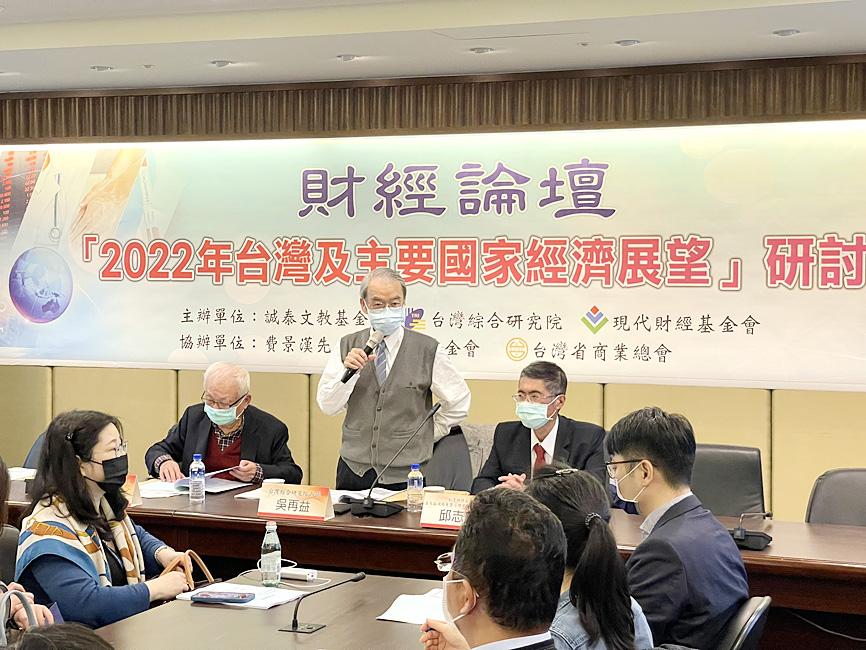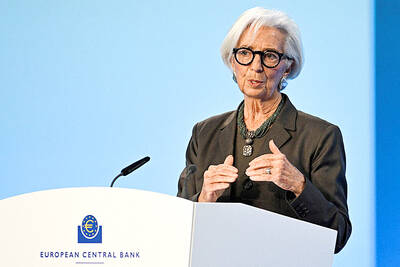Taiwan’s economy is likely to grow at a rate of 6.07 percent this year and 4.05 percent next year, driven by healthy exports and private investment, as the world learns to coexist with variants of SARS-CoV-2, the Taiwan Research Institute (TRI, 台灣綜合研究院) said yesterday.
Its projection of 6.07 percent is higher than its July forecast of 5.12 percent, as COVID-19 and containment measures continue to drive a digital transformation worldwide and boost demand for Taiwan-made electronics, the institute said.
People around the world should eventually become used to living with the virus — resuming normal business operations and private consumption — as the virus mutates.

Photo: Allen Wu, Taipei Times
The Omicron variant of SARS-CoV-2 might not pose as serious a threat to the global economy as other variants, such as Delta, did, institute founder Liu Tai-ying (劉泰英) told a seminar in Taipei.
People might come to treat the coronavirus like the flu, receiving regular vaccine boosters to prevent infection or ease symptoms, Liu said, adding that Taiwanese have joined in local travel and other activities after months of self-imposed isolation to help curb a local outbreak.
The trend should energize private consumption, which was a drag on GDP growth in the second and third quarters, Liu said.
As of Tuesday, Taiwan’s first-dose vaccination rate reached 78.6 percent, while the fully vaccinated rate hit 64.3 percent.
This quarter, the economy is likely to grow 4.1 percent, up from 3.7 percent in the third quarter, based on private investment and the electricity performance index, which suggests high industrial activity, institute president Wu Tsai-yi (吳再益) said.
The two drivers have compensated for lackluster private consumption this year and should help push economic expansion above 4 percent next year, Wu added.
Exports are likely to rise 16.74 percent this year and 18.54 percent next year, while private investment is expected to rise 18.81 percent this year and 2.45 percent next year, TRI data showed.
The government-backed Invest in Taiwan initiative has achieved the goal of attracting NT$1.5 trillion (US$53.95 billion) in investments ahead of schedule, the institute said, adding that Taipei aims to extend the program, as US-China trade tensions persist and more Taiwanese companies in the overseas market aim to return home.
Private consumption this year is likely to only edge upward 0.06 percent, but might accelerate its GDP contribution next year with a 5.3 percent gain, Wu said.

European Central Bank (ECB) President Christine Lagarde is expected to step down from her role before her eight-year term ends in October next year, the Financial Times reported. Lagarde wants to leave before the French presidential election in April next year, which would allow French President Emmanuel Macron and German Chancellor Friedrich Merz to find her replacement together, the report said, citing an unidentified person familiar with her thoughts on the matter. It is not clear yet when she might exit, the report said. “President Lagarde is totally focused on her mission and has not taken any decision regarding the end of

French President Emmanuel Macron told a global artificial intelligence (AI) summit in India yesterday he was determined to ensure safe oversight of the fast-evolving technology. The EU has led the way for global regulation with its Artificial Intelligence Act, which was adopted in 2024 and is coming into force in phases. “We are determined to continue to shape the rules of the game... with our allies such as India,” Macron said in New Delhi. “Europe is not blindly focused on regulation — Europe is a space for innovation and investment, but it is a safe space.” The AI Impact Summit is the fourth

CONFUSION: Taiwan, Japan and other big exporters are cautiously monitoring the situation, while analysts said more Trump responses ate likely after his loss in court US trading partners in Asia started weighing fresh uncertainties yesterday after President Donald Trump vowed to impose a new tariff on imports, hours after the Supreme Court struck down many of the sweeping levies he used to launch a global trade war. The court’s ruling invalidated a number of tariffs that the Trump administration had imposed on Asian export powerhouses from China and South Korea to Japan and Taiwan, the world’s largest chip maker and a key player in tech supply chains. Within hours, Trump said he would impose a new 10 percent duty on US imports from all countries starting on

STRATEGIC ALLIANCE: The initiative is aimed at protecting semiconductor supply chain resilience to reduce dependence on China-dominated manufacturing hubs India yesterday joined a US-led initiative to strengthen technology cooperation among strategic allies in a move that underscores the nations’ warming ties after a brief strain over New Delhi’s unabated purchase of discounted Russian oil. The decision aligns India closely with Washington’s efforts to build secure supply chains for semiconductors, advanced manufacturing and critical technologies at a time when geopolitical competition with China is intensifying. It also signals a reset in relations following friction over energy trade and tariffs. Nations that have joined the Pax Silica framework include Japan, South Korea, the UK and Israel. “Pax Silica will be a group of nations